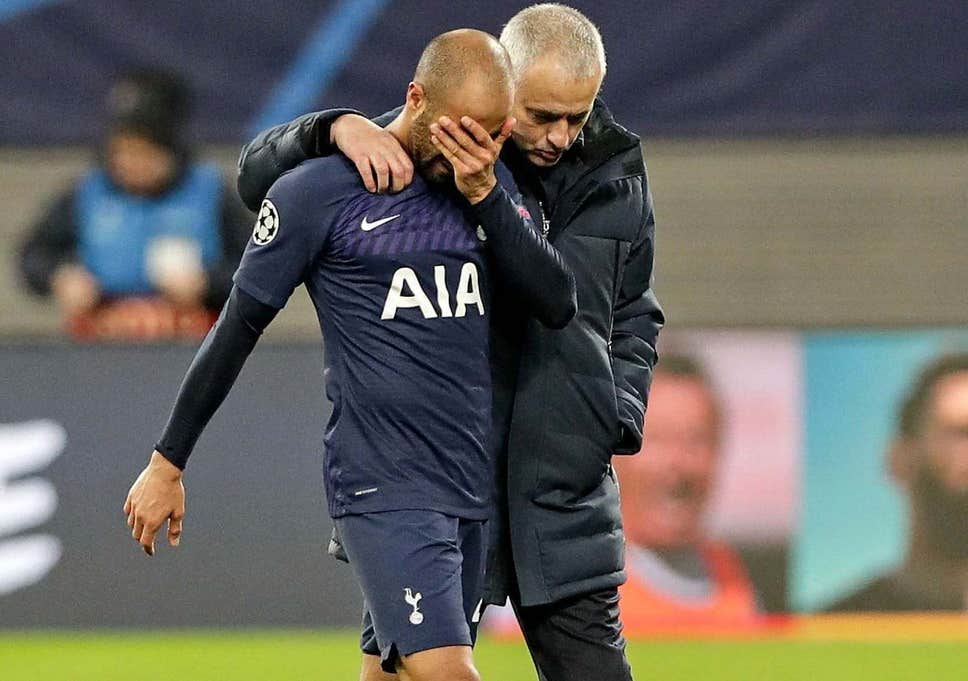No matter how you spin it, Tuesday’s Champions League exit in the last 16 at the hands of RB Leipzig, 3-0 on the night and 4-0 on aggregate, is not the first part of “one step back, two steps forward” for the Jose Mourinho era at Tottenham. The Jose Mourinho third season syndrome, where he criticizes players publicly, turns off fans, and takes the club to a worse place than where it was when he joined, has reached critical mass. After only three months at Spurs.
When looking at it, what was the point of hiring Jose Mourinho in November to replace Mauricio Pochettino? Really? First, trophy specialist. Second, defensive solidity. Both of those, though, have failed to materialize this season, questioning whether Mourinho should remain employed in North London.
Against Leipzig Tuesday, Mourinho once again turned to a makeshift backline different than the defensive selection from any previous games. This time, Ryan Sessegnon played as a left wing-back with Serge Aurier on the opposite flank. For the back three, from right to left, utility defender and youngster Japhet Tanganga, midfielder Eric Dier, and out of position Toby Alderweireld started at Red Bull Arena.
And they got picked apart. Leipzig's speed got the better of them all night. The German side's left wing-back, Angeliño, got in behind the defenders on countless occasions, including the second goal where he assisted Marcel Sabitzer's header. Timo Werner and Christian Nkunku switched constantly as wide attackers, flanking Patrick Schick at center forward. And Spurs couldn't handle them, Werner in particular.
After the painful 90 minutes, or 180 really, came to an end, it was clear Tottenham are nowhere close to Leipzig's level. Julian Nagelsmann, Leipzig's manager affectionately nicknamed Baby Mourinho, clearly displayed his superior, at least at the moment, managerial talents. Spurs limped through the two legs, never once really showing an impetus for scoring. Following the two matches, nothing positive emerged for them to hang on to. Leipzig are the better team, clear as day.
When Spurs fired former manager Pochettino earlier this year, yes, they had hit a bad run of form. Even going back to last year, the cracks in the squad had started to appear. And Pochettino himself predicted a difficult rebuild coming. That is evidently where they find themselves now, only with Mourinho at the helm now.
The problems plaguing Spurs so glaringly and obviously don't stem from Mourinho. That's an absolute certainty. He, however, hasn't helped matters. Besides being a trophy specialist, Mourinho's most desirable trait as a manager is his pragmatic, sometimes boring and frustrating defense-first approach.
In three months at Spurs, it has been far from defense first. In fact, it almost seems like defense never. The constant chopping and changing of defenders and defensive partnerships, as well as playing guys out of position have created the worst backline cocktail in Europe. A staple of Mourinho's teams everywhere he has managed, strong defensive setups, he's failing at it now.
With the Premier League the only competition Spurs have left, they can "focus on the league," as so many will blindly say. Having only one competition to play in, though, doesn't guarantee a good set of upcoming results. Plus, with all the defensive problems undermining the team, what indicates he'll turn it around now? Absolutely nothing.
Spurs crashed out of the FA Cup at home penalties to bottom of the table Norwich. And now, they left Europe slumping their heads. Will they finish top four? Not with how they're playing now. They've not won the last three Premier League games and have an in-form Manchester United heading their way this weekend. Already seven points off a Champions League spot, that gap might become larger and more insurmountable for Spurs in just a few days' time.
So, what was the point of hiring Mourinho? It's easy to question in hindsight, of course. With his name and pedigree, the gamble must've seemed worth it to Spurs.
But is he really doing better than Pochettino did? Spurs will not win a trophy this year. Same. And the defensive issues haven't gotten solved. Same. If he hasn't accomplished the two things they hired him for, winning trophies and shoring up the defense, should Spurs fire him?
Crystal Palace fired Frank De Boer after four Premier League games, five in all comps, and zero goals scored or points earned in 2017. Just 77 days after hiring the dutchman. American Bob Bradley lasted 84 days at Swansea City in 2016 after 11 games and no discernable improvement. Hell, this year alone, Quique Sanchez Flores got hired at Watford as the interim manager. After three months and 10 Premier League games, he too got the sack. Managers have been fired far quicker, for far less, and with far less failure than Mourinho. If Spurs keep him, they need to be 100% positively reassured that Mourinho will make them better after a couple of transfer windows.
Looking at his previous jobs, especially the last one with Manchester United, it's a pretty lofty expectation. Optimistic, we should say instead. For Spurs, it's clearly worth the gamble. But will it pay off? Just ask the Man U, Chelsea, and Real Madrid boards, all previous Mourinho employers, and see how quickly they laugh in your face and hang up the phone.
Mourinho's hiring was a step back. This round of 16 exit is another step back, especially when juxtaposed with last year's appearance in the final. And there don't appear to be any steps forward coming in the near future.










































